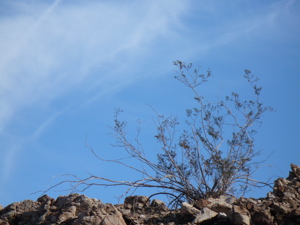You are currently browsing the tag archive for the ‘Psalms’ tag.

John Burroughs wrote: “Natural selection is just as good a god as any other. No matter what we call it, if it brought man to the head of creation and put all things (nearly all) under his feet, it is god enough for anybody.” That is an allusion to Genesis 1:26 and Psalm 8:6.
Can stoicism overcome the nihilism associated with Darwin’s view, overcome what Burroughs called “the cosmic chill.” I think Burroughs believed stoicism would warm us. He wrote that “most persons feel homeless and orphaned in a universe where no suggestion of sympathy and interest akin to our own comes to us from the great void.” And then, in a sentence that alludes to Psalm 8:3-4 and to Darwin’s great work, he wrote: “A providence of impersonal forces, the broadcast, indiscriminate benefits of nature, kind deeds where no thought of kindness is, well-being as the result of immutable law – all such ideas chill and disquiet us, until we have inured ourselves to them.”
Inure: this is the counsel of stoics.
Burroughs wrote these lines in a work he titled stoically, “Accepting the Universe: Essays in Naturalism” (1920.)
Thoreau had already famously written, “In wildness is the preservation of the world.” They are related, I think – wildness and natural selection. Still, I am not sure Thoreau meant it that way. Although some critics have suggested that wilderness or nature was Thoreau’s god, and that a Zen theme (which is a stoical theme) can be detected in some of his writings, I think wildness was not natural selection to him – wildness was the opposite of civilization. Thoreau was engaged in resistance, not acceptance. In wildness was hope to him.
For me, stoicism fails. Resistance is my path. Resistance, and, like the psalmist and Thoreau, hope that we will find sympathy, kindness in the wildness in or beyond the moon and the stars.
Darwin and Thoreau are the preeminent naturalists. I return to their writings again and again to check my bearings. Their words have influenced our thinking, my thinking, so much about nature and life – what they are and what they mean – and about humanity – who we are and how to live.
Darwin perhaps started out to find out what nature is and who we are, but inevitably his findings bear heavily on what nature means and how we live. Thoreau started out perhaps in the opposite direction to find out what nature means and how to live, but his findings are likewise important to what nature is and who we are.
In the chapter of Walden titled, “Where I Lived and What I Lived For,” Thoreau wrote that he went to the woods to find out whether life is “mean” or “sublime,” whether this world and life are “of the Devil or of God.” In writing Walden he seemed to have found that life is sublime and of God. Darwin’s findings are harder to assess, but I think not dissimilar. Natural selection depends on so much cruelty, and yet, by ultimately favoring variations that promote the life of a species, it seems more sublime than mean.
At the very end of Walden, Thoreau recounts a story he had heard, a parable, about a strong and beautiful bug that hatched from an egg deposited long ago in a living apple tree that had since been cut and made into a farmer’s table. He wrote that the bug was “heard gnawing out for several weeks, hatched perchance by the heat of an urn.” Thoreau asked, “Who does not feel his faith in a resurrection and immortality strengthened by hearing of this?”
Thoreau went into the woods to “live deep and suck out all the marrow of life, to live so sturdily and Spartan-like as to put to rout all that was not life.” Thoreau went into the woods to be born anew and to gnaw his way to life like the bug that was born embedded in the wood of the farmers table and gnawed his way to the surface. It is the same urge to live that drives natural selection.
Neither Darwin nor Thoreau had a conventional faith. Darwin was an agnostic who believed prayer had no meaning. Still, he wondered whether the “immense and wonderful universe” was the work of God. Thoreau wrote that most people have “somewhat hastily concluded that it is the chief end of man to glorify God and enjoy him forever,” and yet he felt his faith in resurrection strengthened by nature and by hearing the story of the bug that emerged so improbably from the farmer’s table.
The writings of Darwin and Thoreau help me keep my bearings. When I feel most lost, though, it is not the writings of Darwin or Thoreau that I read. When I feel most lost I read ancient words that speak to the meaning of nature and life. I often read Psalm 104, the nature psalm. The words are different there than in Darwin and Thoreau, but I think the sentiment is the same. I hear in the psalm, as in the writings of Darwin and Thoreau, praise for the immense wonder and beauty of life. Psalm 104, verse 24: “O Lord, how manifold are thou works! In wisdom hast thou made them all: the earth is full of thy riches.” Somehow, in these words, I find my way again.

Recent Comments